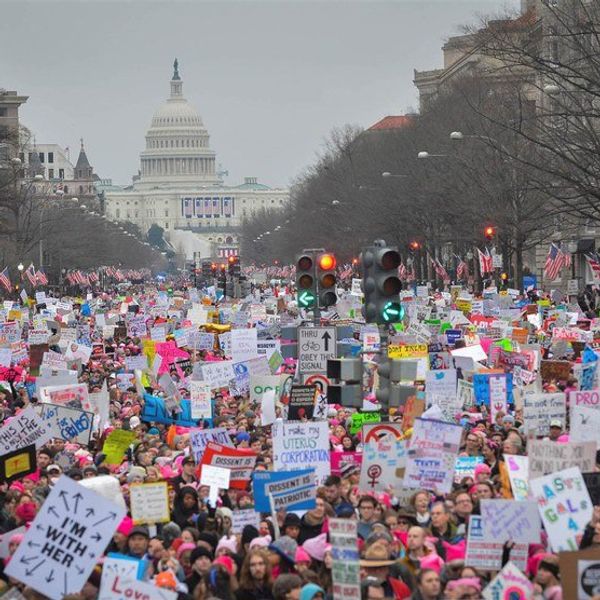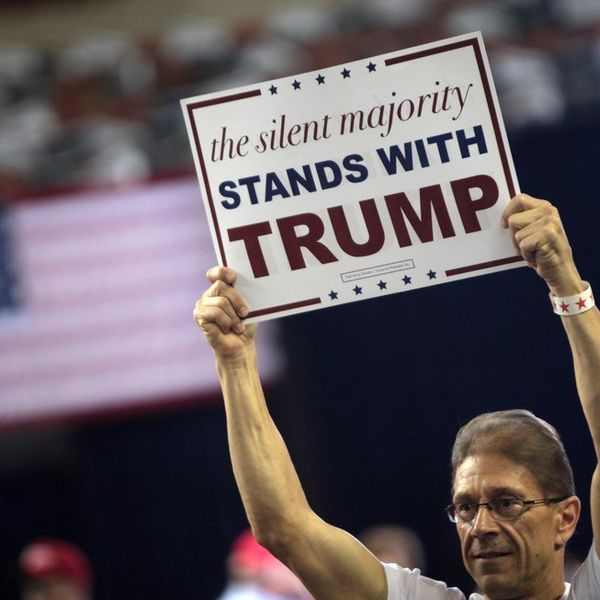Living in Trump's America, it's almost impossible for someone like me not to look back on campaign season and wonder where we went wrong. How did this television personality trick his way into the oval office?
I've never been a huge Hillary supporter, but I have definitely always been anti-Trump, and I can confidently say I don't regret my decision to vote for someone as experienced as Clinton. And I refuse to accept the idea that her loss had nothing to do with sexism.
Right before November 2016, a poll showed a significantly greater number of Americans reporting that they were ready for a female president. But even though Clinton was technically able to win over a greater number of voters than Trump was in the polls, she still fell short in breaking the biggest glass ceiling in modern America. And it is possible that her scandal-rich history is mainly responsible for Americans’ distrust and overall negative opinion of her, but it would be ignorant to disregard the obvious gender-based discrimination that publicly occurred in the race Clinton lost against an inexperienced rich white man.
There’s no sense in denying that Clinton’s political past is linked to countless scandals — from Whitewater to Benghazi to the private email server (just to name a few), her name has been linked to infamous headlines for decades. But it cannot be argued that one would prefer voting for Trump over Clinton for this reason, when he has been involved in an equal if not greater amount of public controversies.
Trump has been publicly accused of discriminatory rental practices toward minorities, hiring undocumented workers, being tied to the mafia, filing for numerous bankruptcies, being charged with sexual assault allegations, being sued for antitrust violations, and refusing to pay income tax. These are not a complete list of his lifelong scandals, nor do they include his racist, sexist, and xenophobic rhetoric. So how is it that when two scandal-ridden candidates run against each other, only one is more publicly denounced because of them?
It was partially Trump’s male privilege that gave him an edge over Clinton in the polls. Being the demographic model of what America expects in a national leader, Trump did not have to work towards perfection to gain interest in voters. He is dramatically less experienced and far more factually controversial, but because he is a straight white rich man, he had an easier time gaining votes. Clinton, however, could not have possibly made history without a squeaky clean record and the ideal feminine-masculine-balanced presence.
With popular slogans like “trump that bitch” emerging from Trump supporters and Trump himself talking about his opponent as not having “a presidential look” and being a “nasty woman,” it goes without saying that this presidential election was tainted with sexism throughout. Trump constantly “manterrupted” Clinton during debates, devaluing everything she said, showing he was more entitled to share his thoughts than she was. Normalizing this type of blatantly public misogyny in a party-leading presidential candidate left no room for Clinton to shatter any ceilings. Trump supporters felt comfortable being openly misogynistic along with the media and the Republican frontrunner himself.
What Clinton was experiencing during the election was a feminist backlash. Since she, and other successful female politicians, have made such notable strides toward equality, many believe that this has caused the conservative public to become anxious about these progressive changes. This resulted in their resorting to misogynistic name calling and sexist satire rather than substantial criticism or objective voting. This similarly happened during Barack Obama’s election, when white Americans felt more comfortable expressing racist rhetoric than they had before, using prejudiced ideals as their main form of aggression. The idea of this backlash stems from a social psychological theory called “precarious manhood,” in which men feel that they have to work harder to maintain their masculinity than women have to work to maintain their femininity. When men feel their masculinity is being in any way compromised, like a woman taking a job that they feel is inherently theirs, they fight back to defend themselves. This is why 2016 Republican political merchandise often included an abundance of sexualized language aimed at invalidating Clinton as a candidate.
Clinton lost the coveted oval office seat to an intense feminist backlash. Taking her place in the White House is a man with an arguably more controversial past who is comfortable with sexist rhetoric, a demographically familiar man who America found preferable over a candidate with a few scandals and far more political experience — a decision determined substantially based on gender stereotype.





















